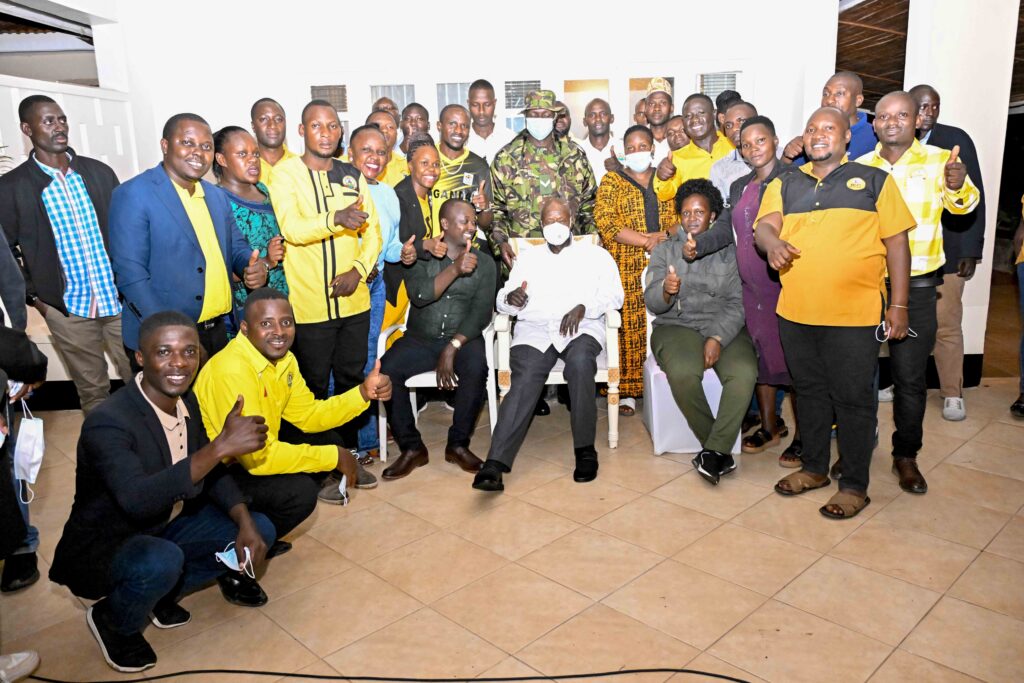
MBALE. President Museveni yesterday held an engagement with groups of the National Resistance Movement (NRM) youth mobilizers at State Lodge – Mbale, urging them to ground their political work by understanding people’s daily struggles, especially poverty.
The youth mobilizers were led by Ms Hellen Seku, Commissioner of the National Secretariat for Patriotism Corps (NSPC).
The groups present included the Buganda Youth Caucus, the National Youth Council (Executive), Buganda Ku Museveni, the National Secretariat for Patriotism Corps, the Yellow Power Movement and district-level NRM mobilizers.
In a candid interaction, the President told the mobilizers that true political mobilization goes beyond excitement and singing. He said it requires first understanding whether communities are in good or difficult situations and then guiding them on how to solve their problems.
“When you talk of mobilization, you must ask, how are these people? Are they in a good situation or a bad situation, especially poverty? The real mobilization is to get people out of poverty. The real mobilization is to know people’s problems and show them how to get out of poverty,” President Museveni said.
He added that while crowds may turn up for rallies out of excitement, lasting support comes from communities recognizing that their leaders have real solutions.
“People should understand their problems and how to solve them instead of just moving around singing. They may support you for networking, but the impact is small. People trusted us because they thought we had ideas and answers to their problems,” he said.
The President noted that the growing crowds at current NRM rallies reflect two things; basing on the peace ushered in after years of conflict, especially in previously war-affected areas, and the fact that the Parish Development Model has begun reaching households directly.
“In the past, programs passed through intermediaries and our own people ended up being involved in their own things. That is how I stopped Operation Wealth Creation,” he said.
Drawing parallels to the Luweero Triangle’s support during the liberation struggle, President Museveni reminded the youth that people rallied behind him and his colleagues at that time because they analyzed their problems well and offered practical answers.
He emphasized that effective mobilization does not require large budgets.
“This mobilization does not need a lot of money. The only money you may need is your own transport for fuel, not refund,” he said.
He encouraged the mobilizers to reflect on how the NRM built trust before forming government.
“I am glad you came. You are young people. When we started, we were like you. We showed the people the way forward. We refused gender divisions and religious divisions. We taught them how to get out of poverty, and to be well behaved. Let your light shine before men.”
President Museveni again highlighted the Four Acre Model, first introduced in the 1996 manifesto, as the foundation for sustainable household wealth.
He explained that one acre should be planted with coffee, one with fruit trees like citrus or mangoes, one dedicated to pasture for livestock, and one for food crops.
He later broadened his discussion into a deeper analysis of Uganda’s socio-economic transformation, noting that mobilizers must understand the three parts of society, the people, their economic wellbeing, and their politics.
He gave an example of the traditional Banyankole communities who lived as nomads and worked only for the stomach despite owning cows.
The President explained: “We studied the world. In America, Australia and New Zealand, they also had cows, but the cows were valuable in terms of money. Our idea was: why can’t our people be like the ranchers in America?”
The President added that a proper diagnosis revealed four major obstacles keeping cattle corridor communities out of the money economy, lack of water due to absence of natural springs, bush burning during the dry season, tick-borne diseases, and the cultural habit of keeping cattle for prestige rather than commerce.
“We had to sit down and read their minds, to find out what was stopping them from joining the money economy,” he said.
“For water, we said: you must trap water from the roof. For bush burning, we told them to stop burning grass in the dry season. For ticks, they kept running away instead of treating diseases, yet we had Mbarara Stock Farm.”
He said proper mobilization must always begin with such deep diagnosis of community challenges.
Mr. Henry Luzinda, a mobilizer from Wakiso District, thanked the President for empowering young people through programs like the Parish Development Model and the proposed Graduate Fund.
“Youth livelihoods are changing Your Excellency, thank you for the 30% of PDM funds that you are giving to the youth, thank you so much for the graduate fund. We commit to take this message village to village so that the youth who graduate after two years and haven’t found a job can benefit from this fund which is your initiative,” he said.
Ms. Sawuya Nambatta, Chairperson of Buganda Ku Museveni, said PDM has already transformed lives in many communities, and mobilizers are spreading that success story across villages.
Another mobilizer, Mr. Pauson Twinamatsiko, also expressed gratitude to the President for supporting youth-led initiatives.